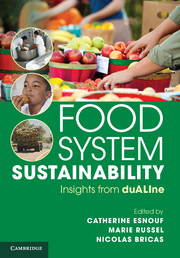Book contents
- Frontmatter
- Contents
- Foreword
- Acknowledgements
- Introduction
- 1 Context: new challenges for food systems
- 2 Consumption and consumers
- 3 Carbon footprint and nutritional quality of diets in France
- 4 Food systems
- 5 Industrial organisation and sustainability
- 6 Urbanisation and the sustainability of food systems
- 7 Losses and wastage
- 8 International trade, price volatility and standards for sustainability
- 9 Elements for a foresight debate on food sustainability
- 10 A critical panorama of methods used to assess food sustainability
- Conclusion
- References
- List of abbreviations
- List of duALIne experts
- Index
8 - International trade, price volatility and standards for sustainability
Published online by Cambridge University Press: 05 April 2013
- Frontmatter
- Contents
- Foreword
- Acknowledgements
- Introduction
- 1 Context: new challenges for food systems
- 2 Consumption and consumers
- 3 Carbon footprint and nutritional quality of diets in France
- 4 Food systems
- 5 Industrial organisation and sustainability
- 6 Urbanisation and the sustainability of food systems
- 7 Losses and wastage
- 8 International trade, price volatility and standards for sustainability
- 9 Elements for a foresight debate on food sustainability
- 10 A critical panorama of methods used to assess food sustainability
- Conclusion
- References
- List of abbreviations
- List of duALIne experts
- Index
Summary
Questions of food sustainability cannot be limited to the national sphere, insofar as international interactions are undeniable. This chapter focuses on their role, concentrating on the volatility of global food prices and on public and private norms and standards.
The international dimension of these questions is reflected first of all by questions concerning the volatility of agricultural prices. Although volatility itself is not the preserve of international markets, it has become difficult to address this issue without taking account of the global dimension of agricultural markets, in terms of both the formation of prices and their subsequent adjustments. These issues have become particularly acute since the recent crises affecting food prices. When linked to the issue of food sustainability, they lead to questions on the types of adjustments made at a global level and the resulting differences according to the level of development of a country, as well as justifications for, and the modes of, public intervention. Commercial policies that are directly affected by international interactions play a particular role in this respect, and this merits discussion in order to analyse the challenges inherent in their application and any disciplines associated with their use.
- Type
- Chapter
- Information
- Food System SustainabilityInsights From duALIne, pp. 158 - 175Publisher: Cambridge University PressPrint publication year: 2013

